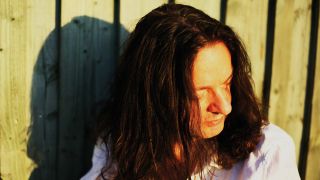Not every guitarist can say they’ve played on one of the highest-grossing tours of all time, but Dave Kilminster certainly can.
The English axeman was enlisted for Roger Waters’ record-breaking The Wall tour and gargantuan Dark Side Of The Moon shows, but thankfully he’s got more in his locker than just backing a Pink Floydian. Kilminster has previously worked with the likes of Keith Emerson, Carl Palmer and John Wetton, and he’s just released his second solo rock album, …And The Truth Will Set You Free…, a soulful cocktail of atmospheric tunes and guitar majesty.
You’ve said that you listened to a lot of your favourite records from when you were growing up before you made the album…
It was a bit of a nostalgia trip, I guess. I was trying to find some new things to be excited about, but I just couldn’t really find anything, so I thought I’d go back. I mostly listened to the first few Queen albums, Led Zeppelin, Van Halen – all that kind of stuff – and some more eclectic records. There’s a whole load of music in my head from that period. I don’t think you can escape your roots, whether you want to or not.
The playing on the album strikes the perfect balance between technicality and emotion. What’s the secret?
To write with your ears. Because I’m producing as well, I tend to treat it as songs rather than an excuse to play guitar. I’m not going to play something that doesn’t fit. Brian May, for example, is amazing at creating these wonderful melodies that become an integral part of the sound. I don’t want to play just for guitarists – I’ve done enough music festivals, trade shows, teaching and magazine instruction. I want to actually make music for people – normal people.
What are the prog elements on the record?
Because some of the numbers are pushing the 10-minute mark, I guess straight away that puts it in a particular category. For me, prog originally was a combination of rock musicians listening to a lot of classical music. I’ve always listened to classical, and I’ve got a real string quartet on the album too. I guess the odd time signatures and the classical influence push it in a prog direction, but I’m not necessarily influenced by other prog artists. I think I’m doing it in my own way.
You previously said the title is influenced by the world being “full of lies”. What sparked those thoughts?
Where to begin? Everything! The stupid things you see on the internet nowadays and the random things people share without finding out whether it’s true or not. It just seems to be so difficult to find the truth in anything these days, especially in music. What they play on mainstream radio in this country, there are no musicians on it – it’s all done on a computer and voices are made to sound like an answering machine or something. I want to see real passion, soul and energy back in music, and that was an important element to me. Even bands like Nirvana, you can just hear passion and energy, and it doesn’t matter if it’s technically perfect or not.
Did being on the two massive Roger Waters tours influence your songwriting in any way?
I’ve always said definitely not, but I guess something like Stardust may not have happened without it. I almost started writing it as a bit of a joke. I played the intro and it reminded me of Shine On You Crazy Diamond, but it didn’t go any further than that. I had an afternoon of rehearsal though, and just before we were about to pack up, I showed the guys and they really liked it. I was never really a huge fan of Pink Floyd – I was always interested in more energetic or technically demanding things. But it makes you appreciate the power of simplicity, if you like.
Did you feel extra pressure because the tours were so huge?
The pressure was only really noticeable when I was on top of the wall [playing the Comfortably Numb solo]. That was the moment I was always happy to finish. You’re on your own, very exposed, balancing on this 40-foot-high platform that is very, very wobbly. The worst time was outdoors in San Francisco – it was cold, the wind was whipping off the bay and you could see the wall moving. It was moving so much that it was hitting the platform I was standing on. I don’t miss that bit, I really don’t! But I wanted to do a good job and make the Pink Floyd fans happy. I was aware that it was a big part of the show and it was an important song.
It must have been a bit of a comedown after that tour…
You have no idea how depressing it is to finish a tour like that and think it will probably never happen again. That’s partly why I threw myself into writing music. I’ve got at least another two albums of material that are pretty much ready to record.
You’ve also played with legendary prog musicians such as Keith Emerson and John Wetton.
I’ve had an amazing career – I feel so incredibly lucky that I’ve played with these incredible musicians. Keith Emerson was one of my musical heroes – he made me want to play piano. It’s been amazing. I still can’t really believe some of the things that have happened.
Are there any newer prog bands or musicians around who are floating your boat at the moment?
Steven Wilson is amazing. Quite possibly a genius, actually. I went to see his band before I recorded the album and I think that’s why some of the tracks have ended up a bit longer. I heard his new album the other day – it’s incredible. His use of electronics is wonderful and seamless. I was actually asked to play in his band a few years ago but I was away on tour. That was before Guthrie Govan came in. But Guthrie is amazing, probably the best player that’s ever been, to be honest.
_…And The Truth Will Set You Free… is out now on Cherry Red. See http://www.davekilminster.com for more information. _


